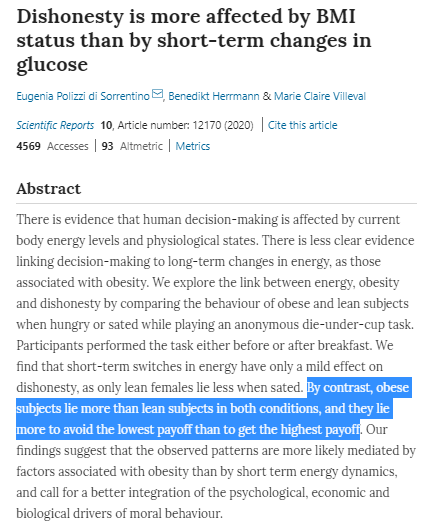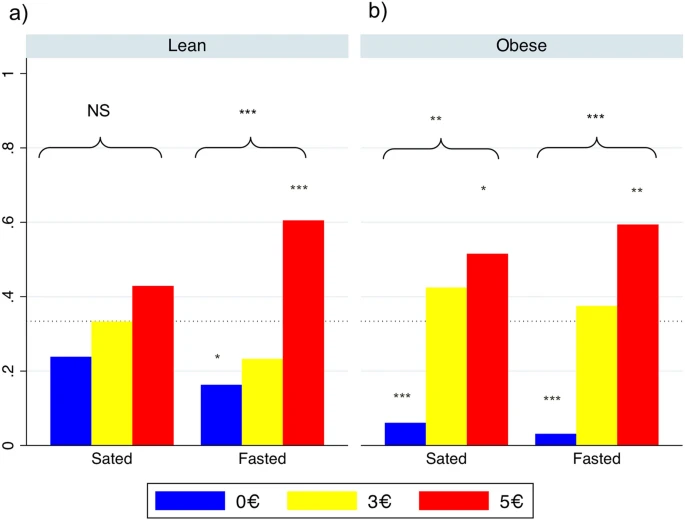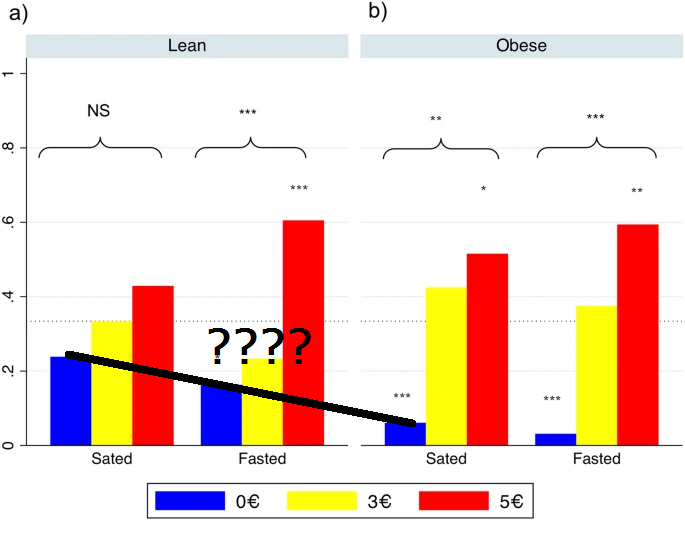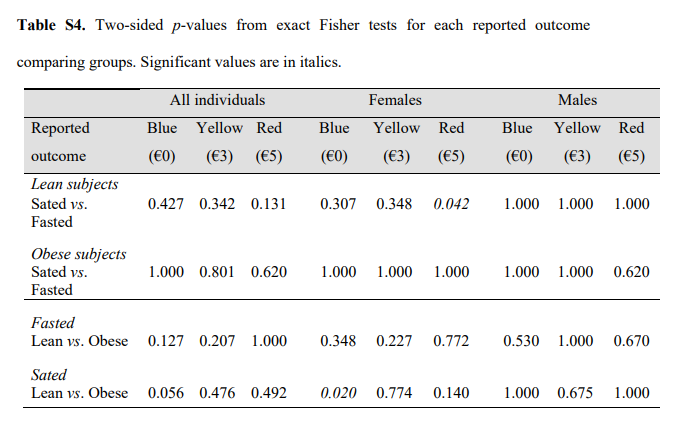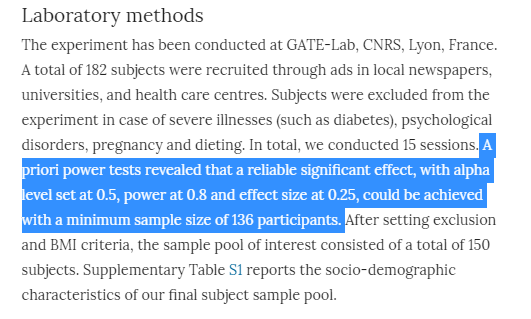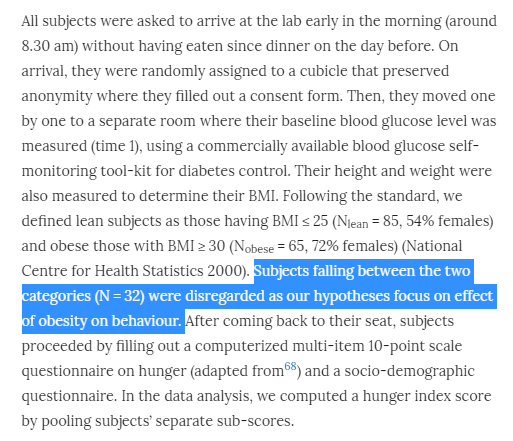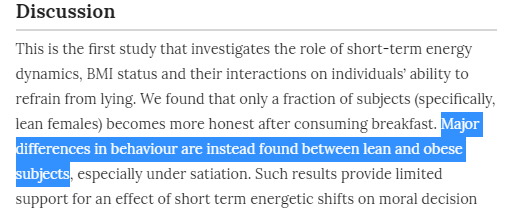Ok, so there& #39;s a lot to unpack here. This was a randomized controlled trial looking at the impacts of fasting on lying in lean and obese people
Headline finding - obese people lie more than lean ones https://twitter.com/YoniFreedhoff/status/1291126474616045571">https://twitter.com/YoniFreed...
Headline finding - obese people lie more than lean ones https://twitter.com/YoniFreedhoff/status/1291126474616045571">https://twitter.com/YoniFreed...
Now, leaving aside the abhorrent nature of the study, let& #39;s look at the science here because I think it is VERY REVEALING
The study was a bit of a headache to unravel, but despite the confusing writing the design seems relatively simple:
People were randomized to either get breakfast before or after they played a dice game
People were randomized to either get breakfast before or after they played a dice game
The dice in this game had three evenly distributed colours - blue, yellow, and red
People had to report the colour they got on their first dice roll. If it was blue, they got no money, yellow they got 3 Euros, and red, 5 Euros
People had to report the colour they got on their first dice roll. If it was blue, they got no money, yellow they got 3 Euros, and red, 5 Euros
Because the game was random, you can use the reported numbers to compare to the numbers you& #39;d get if people reported the colours accurately, and determine whether they were probably lying
Here& #39;s the main finding in graphical form. If you look at the columns on the right, they are higher than the ones on the left, so obese people lie more!
Except, there& #39;s something a little weird here. The statistical tests don& #39;t actually compare obese and lean people
Except, there& #39;s something a little weird here. The statistical tests don& #39;t actually compare obese and lean people
If you look carefully, all of these statistical tests are comparing within-group differences - i.e. how likely it is that within the obese/fasted group the results would& #39;ve been observed due to chance
But they AREN& #39;T comparing obese and lean people! What you expect to see, going by the abstract and discussion of the study, is a statistical test comparing the proportions BETWEEN groups i.e. comparing obese with lean
Fortunately, the authors did this analysis as well!
You can find it in table 4 of the supplementary materials https://abs.twimg.com/emoji/v2/... draggable="false" alt="🤦♂️" title="Mann schlägt sich die Hand vors Gesicht" aria-label="Emoji: Mann schlägt sich die Hand vors Gesicht">
https://abs.twimg.com/emoji/v2/... draggable="false" alt="🤦♂️" title="Mann schlägt sich die Hand vors Gesicht" aria-label="Emoji: Mann schlägt sich die Hand vors Gesicht">
What do we see?
You can find it in table 4 of the supplementary materials
What do we see?
Well, here& #39;s the table. The bottom two rows are the interesting ones
NO significant differences between reported proportions for pretty much any subgroup of lean vs obese people
NO significant differences between reported proportions for pretty much any subgroup of lean vs obese people
In fact, it appears as if the main finding of this paper completely contradicts the results of this analysis. There does not appear to be any statistically significant differences in the reported values when comparing lean and obese people at all!
Now, that& #39;s pretty bad. But it gets worse
This study was probably not designed to test the question of obese vs lean
How do we know? Look at the sample size calculation
This study was probably not designed to test the question of obese vs lean
How do we know? Look at the sample size calculation
So, they& #39;ve computed their sample size based on the idea that they want to detect an effect size of 0.25 between two groups
But...they didn& #39;t include any indication of obese vs lean here. The eventual sample size (150) shows us that
But...they didn& #39;t include any indication of obese vs lean here. The eventual sample size (150) shows us that
Instead, it seems almost certain that the original study just looked at lying in fasted vs breakfasted people
We can actually see this even more clearly because they ran 36 people through the entire procedure only to exclude them after the fact!
We can actually see this even more clearly because they ran 36 people through the entire procedure only to exclude them after the fact!
This starts to get a bit murky, because I cannot find a pre-registration for the study
That& #39;s worrying, because changing your hypothesis after running a study is a classic sign of p-hacking
That& #39;s worrying, because changing your hypothesis after running a study is a classic sign of p-hacking
Another sign is the statistical analysis. I count upwards of 100 comparisons (Fisher& #39;s exact test, chi squared etc) with no correction for multiple comparisons
That& #39;s...worrying
That& #39;s...worrying
If you apply a Bonferroni correction to the results, pretty much every statistically significant finding completely disappears, which is not surprising given that they ran SO MANY tests
Bringing it back home, we have this sentence in the discussion
According to supplementary table 4, this simply isn& #39;t true!
According to supplementary table 4, this simply isn& #39;t true!
Obese people had differences in behaviour, but the statistical comparisons DIDN& #39;T SHOW A SIGNIFICANT DIFFERENCE
Pretty major issue, that
Pretty major issue, that
Anyway, the paper is abhorrent regardless, but I think it also shows some worrying signs of being constructed after the fact from a dataset of a trial with different aims
Oh, another issue - the paper makes an inherently misleading claim about causality. The primary findings were of a subgroup analysis of non-randomized groups (lean vs obese) and so it& #39;s not clear whether this was causal anyway
Because the randomization was simply fasted vs breakfast, the causal attribution for this study should be comparing those two groups, not the subgroups of obese vs lean

 Read on Twitter
Read on Twitter